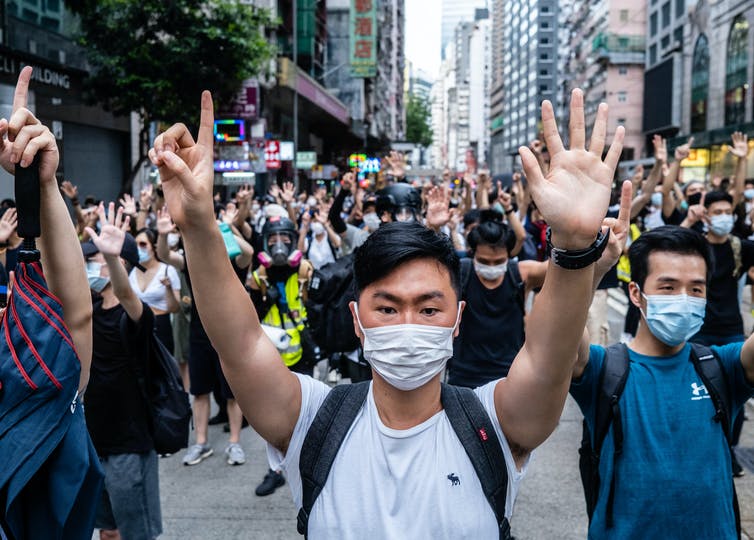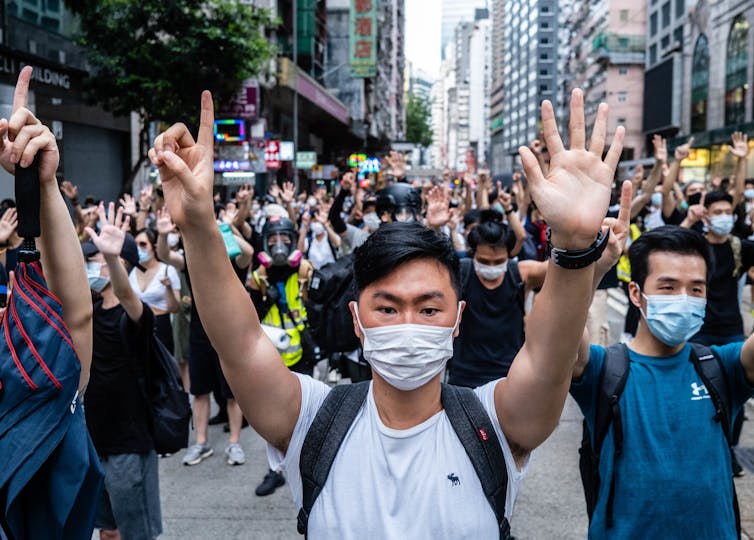
Brendan Clift, University of Melbourne
In recent days, the prime ministers of the UK and Australia each declared they are working toward providing safe haven visas for Hong Kong residents. In the US, lawmakers passed a bill that would impose sanctions on businesses and individuals that support China’s efforts to restrict Hong Kong’s autonomy.
The prospect of a shift from rhetoric to action reveals just how dire the situation in China’s world city has become.
July 1 is usually associated with Hong Kong’s annual pro-democracy march. This year, it saw around 370 arrests as protesters clashed with police under the shadow of a brand new national security law.
Hong Kong police have been cracking down hard on demonstrators for over a year – with Beijing’s blessing – and most of this week’s arrests were possible simply because police had banned the gathering.
But ten arrests were made under the national security law for conduct including the possession of banners advocating Hong Kong independence.
Already, a pro-democracy political party has disbanded and activists are fleeing the city.
6. I thank my friends for their understanding, and I apologize for the ambiguities when it comes to my personal information. Criticisms ahead of me will stem not only from misunderstanding, disheartenment, and anxieties, but also ill intentions. These are all mine to face.
— Nathan Law 羅冠聰 😷 (@nathanlawkc) July 2, 2020
What’s in the national security law and how it could be applied
The national security law had been unveiled just hours earlier, its details kept secret until this week. It was imposed on Hong Kong in unprecedented circumstances when Chief Executive Carrie Lam, Beijing’s appointed leader in the city, bypassed the local legislature and promulgated it directly.
The law creates four main offences: secession, subversion, terrorism and collusion with foreign forces to endanger national security.
Hong Kong law already contains some offences of this sort, including treason, a disused colonial relic, and terrorism, tightly defined by statute. The new national security offences are different beasts – procedurally unique and alarmingly broad.
Secession, for example, includes the acts of inciting, assisting, supporting, planning, organising or participating in the separation or change of status of any part of China, not necessarily by force. This is calculated to prevent even the discussion of independence or self-determination for Hong Kong.
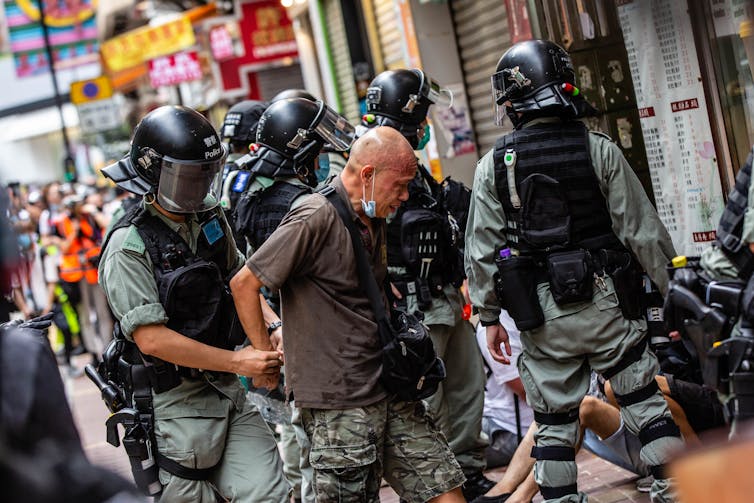 More than 300 people were detained at a protest this week and ten were arrested under the new law. e: Sipa USA Willie Siau/SOPA Images/Sipa U
More than 300 people were detained at a protest this week and ten were arrested under the new law. e: Sipa USA Willie Siau/SOPA Images/Sipa UCollusion includes making requests of or receiving instructions from foreign countries, institutions or organisations to disrupt laws or policies in or impose sanctions against Hong Kong or China.
This is aimed at barring Hong Kongers from lobbying foreign governments or making representations at the United Nations, which many protesters have done in the past year.
The law contains severe penalties: for serious cases, between ten years and life imprisonment. It also overrides other Hong Kong laws. The presumption in favour of bail, for instance, will not apply in national security cases, facilitating indefinite detention of accused persons.
Defendants can be tried in Hong Kong courts, but in a major departure from the city’s long-cherished judicial independence, the chief executive will personally appoint the judges for national security cases.
The chief executive also decides if a trial involves state secrets – a concept defined very broadly in China. In these cases, open justice is abandoned and trials will take place behind closed doors with no jury.
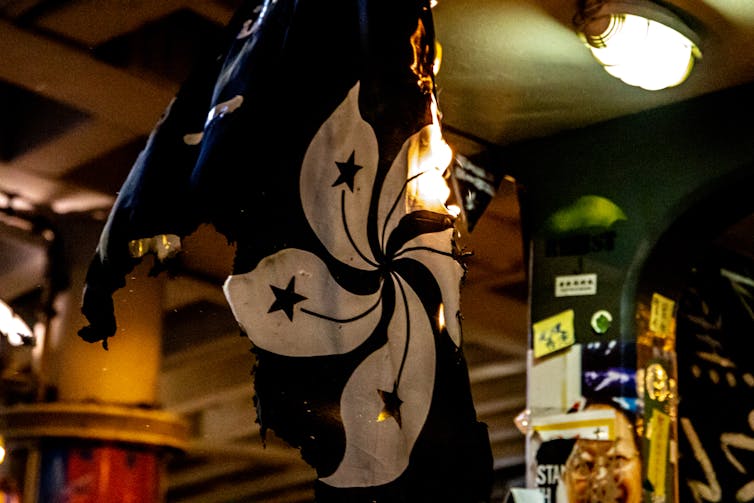 A black Hong Kong flag burning last month during an anti-government demonstration. Viola Kam/SOPA Images/Sipa USA
A black Hong Kong flag burning last month during an anti-government demonstration. Viola Kam/SOPA Images/Sipa USAWhile Hong Kong courts can apply the new national security law, the power to interpret it lies with Beijing alone. And in the most serious cases, mainland Chinese courts can assume jurisdiction.
This raises the prospect of political prisoners being swallowed up by China’s legal system, which features no presumption of innocence and nominal human rights guarantees. China also leads the world in executions.
Much of the national security law’s content contradicts fundamental principles of Hong Kong’s common law legal system and the terms of its mini-constitution, the Basic Law.
Even the territory’s justice minister – another unelected political appointee – has admitted the systems are incompatible.
Read more:
Hong Kong: does British offer of citizenship to Hongkongers violate Thatcher’s deal with China?
Why it is deliberately vague
In the typical style of mainland Chinese laws, the national security law is drafted in vague and general terms. This is designed to give maximum flexibility to law enforcement and prosecutors, while provoking maximum fear and compliance among the population.
The government has said calls for independence for Hong Kong, Tibet, Xinjiang and even Taiwan are now illegal, as is the popular protest slogan “liberate Hong Kong; revolution of our times”.
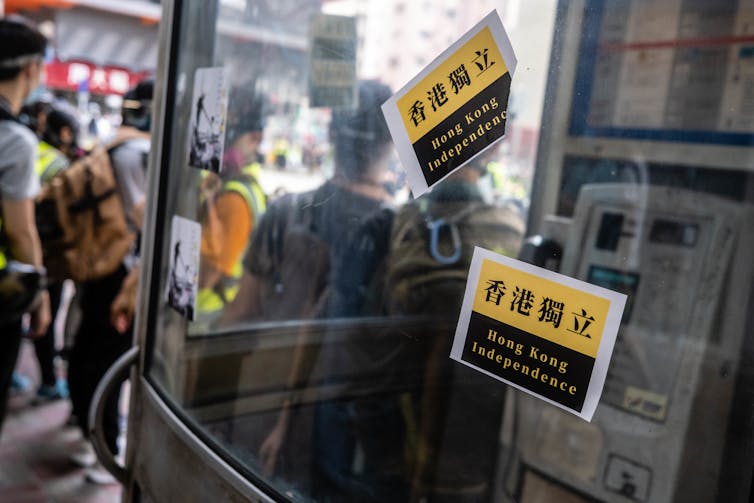 Posting Hong Kong independence stickers can now lead to severe punishments. Sipa USA Willie Siau / SOPA Images/Sipa U
Posting Hong Kong independence stickers can now lead to severe punishments. Sipa USA Willie Siau / SOPA Images/Sipa UA Beijing spokesman has said the charge of collusion to “provoke hatred” against the Hong Kong government could be used against people who spread rumours that police beat protesters to death in a notorious subway station clash last year, echoing the infamous mainland Chinese law against “picking quarrels and provoking trouble”.
The law does not appear to be retroactive, but fears that it could be interpreted that way have caused a flurry of online activity as people have deleted social media accounts and posts associating them with past protests.
This is unsurprising given the Hong Kong government’s record of trawling through old social media posts for reasons to bar non-establishment candidates from standing at elections.
Dissent in any form becomes extremely hazardous
Despite the promise of autonomy for Hong Kong, enshrined in a pre-handover treaty with the UK that China claims is now irrelevant, the national security law has escalated the project to “harmonise” the upstart region by coercive means, rather than addressing the root causes of dissatisfaction.
Under the auspices of the new law, the Chinese government will openly establish a security agency, with agents unaccountable under local law, in Hong Kong for the first time. It has also authorised itself in the new law to extend its tendrils further into civil society, with mandates to manage the media, the internet, NGOs and school curricula.
Under the weight of this authoritarian agenda, dissent in any form becomes an extremely hazardous prospect. It is no doubt Beijing’s intention that it will one day be impossible – or better yet, something Hong Kongers would not even contemplate.
Read more:
China is taking a risk by getting tough on Hong Kong. Now, the US must decide how to respond
The aim of silencing all opposing voices – including those overseas – is clear from the purported extraterritorial operation of the law.
The international community has condemned Beijing’s actions, but its members have a responsibility to follow words with actions. The least that democratic countries like the US, UK, Australia and others can do is offer a realistic path to safety for the civic-minded Hong Kongers who have stood up to the world’s premier authoritarian power at grave personal risk.
Some 23 years after China achieved its long-held ambition of regaining Hong Kong, it has failed to win hearts and minds and has brought out the big stick. Its promises may have been hollow, but its threats are not.![]()
Brendan Clift, Teaching Fellow and PhD candidate, University of Melbourne
This article is republished from The Conversation under a Creative Commons license. Read the original article.
